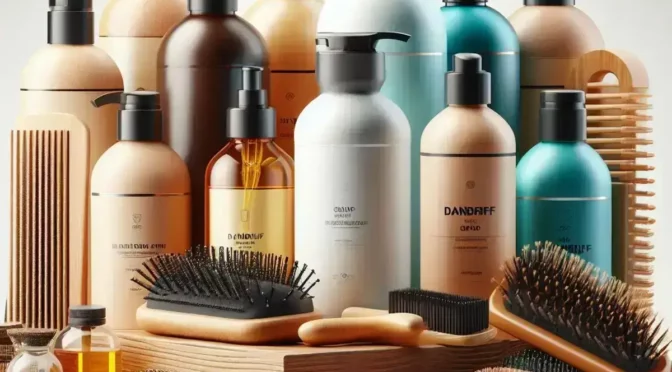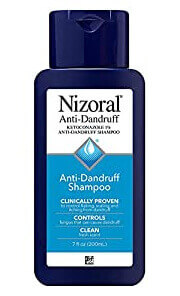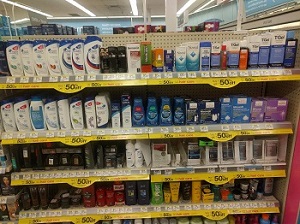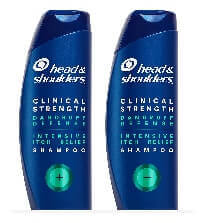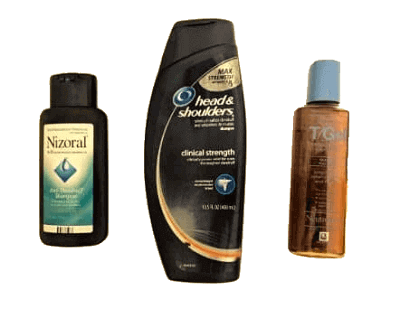This article was originally written on January 26, 2019. Last Updated on June 22, 2024.
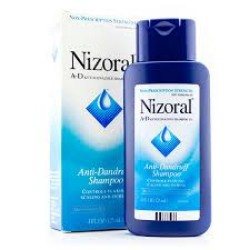
Nizoral (with ketoconazole 1%) is an extremely popular dermatologist recommended dandruff shampoo. It also has modest anti-androgenic and hair growth properties according to a number of studies.
As of June 2024, Nizoral has almost 94,000 reviews on Amazon, with an average rating of 4.6 out of 5 stars. It costs just $14.10 for the smaller 7 fl oz (200 ml) bottle. The larger 14 fl oz (400 ml) bottle is currently priced at $27.53 on Amazon. This is a very affordable price when compared to other bestselling dandruff shampoos.
Update: June 22, 2024 — The Washington Post has an article suggesting that over-the-counter and prescription antidandruff shampoos that contain ketoconazole may help fight hair loss.
There is some evidence that ketoconazole blocks the synthesis of dihydrotestosterone in the scalp and acts as an antagonist of the androgen receptor. See the list of supportive studies at the bottom of this post.
- A November 2023 study from India discussed the successful development and testing of a novel anti-dandruff shampoo incorporated with ketoconazole-coated zinc oxide nanoparticles. The researchers wanted to improve on existing ketoconazole (KTZ) based shampoos with weak skin epidermis absorption and permeability. The prepared nanoparticles showed enhanced activity against Malassezia furfur compared to regular KTZ (1%).
- A May 2022 study from Brazil found that ketoconazole shifts the scalp skin lipid profile, affects Malassezia lipid metabolism and favors biotin-producing bacteria. Biotin improves inflammatory conditions.
Nizoral Shampoo
Nizoral shampoo (1%) is one of the highest rated and reviewed anti-dandruff shampoos that you can buy without a prescription. I rank it as one of the 15 best hair loss shampoos in the world. You can buy it at most stores, including Walmart (5,000 reviews), Target (4,900 reviews), CVS (3,700 reviews) and Walgreens (3,700 reviews).
Nizoral A-D Anti-Dandruff Shampoo with ketoconazole 1%, is consistently rated as one of the best products to counter dandruff, scalp itching, flaking and fungus. We all shed millions of dead skin cells every single day. However, some people have excessive skin turnover on the scalp, leading to dandruff.
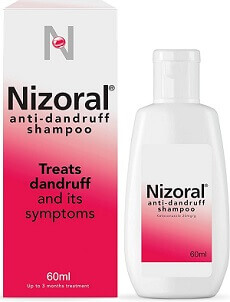
Nizoral (often misspelled as Nizarol) can improve psoriasis symptoms, scaly scalp skin, yeast infections and even foot fungus. Some reports suggest it can also benefit fungal acne, although facial usage is not recommended.
A small bottle of this highly rated antifungal anti-inflammatory product will last for many months. Note that Nizoral 2% shampoo comes in a red bottle and is a different product that requires a prescription in some countries.

The Nizoral 1 percent shampoo is an over-the-counter product, while the medicated 2 percent shampoo requires a prescription in the US. In the UK and Canada, you can purchase the latter off-the-shelf at pharmacies and on Amazon UK. It had 28,600 reviews as of June 2024, with an average rating of 4.6 out of 5 stars. Note that they delineate their units as 20 mg/g, which is the same as 2%. The bottle contains only 60ml of liquid.
Also worth noting, Nizoral shampoo can help reduce hair loss to a moderate extent due to its anti-androgenic properties. See the studies listed at the end of this post that support this point. Other popular hair loss shampoos include Revivogen and Shiseido Adenovital (number 1 in Japan) and Folligen (number 1 in South Korea).
Ketoconazole 1%: The Active Ingredient
The list of ingredients in Nizoral can be found in the FDA label pdf. The key active ingredient is ketoconazole 1%. Ketoconazole (abbreviated KCZ or KTZ) also has some anti-androgenic properties.
To date, only two drugs with very different mechanisms of action have been approved by the US FDA to treat hair loss: Finasteride (Propecia) and Minoxidil (Rogaine).
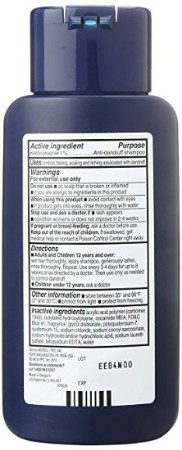
However, Ketoconazole also has some hair growth benefits. It is an imidazole anti-fungal agent that counters dandruff and scalp inflammation.
Ketaconazole will never be officially approved to treat hair loss, because its manufacturer is unlikely to ever file for approval. With sales of Nizoral already going strong globally, it is probably not worth going through all the rigorous expensive clinical trials to get little added benefit.
Ketoconazole is a synthetic drug that is used to treat fungal infections. In particular, the drug flushes out Malassezia (formerly known as Pityrosporum) yeast fungus. Malassezia has been implicated in problems such as dandruff and seborrheic dermatitis. The latter leads to clogged hair follicles.
Other names for similar fungal infections and overgrowth of the scalp include Pityriasis Versicolor, Pityrosporum Ovale and Malassezia Furfur. Skin conditions such as tinea and ringworm may also benefit from this product.
Ketoconazole was originally available in tablet form, but has since also been developed into topical forms such as creams, lotions and shampoos. Note that oral ingestion of ketoconazole can lead to serious side effects such as liver damage in some patients. However, topical cream and ketoconazole shampoo usage have generally not been linked to such side effects.
My Nizoral Experiences for Scalp Itching
A large proportion of hair loss sufferers seem to also get itchy and dry scalp conditions, including dandruff and seborrheic dermatitis. I am one of those, although the severity and frequency of my symptoms is moderate and sometimes goes away for months.
Some years ago, I started using Nizoral 1% anti dandruff shampoo for my itchy inflamed scalp instead of other regular shampoos. I was absolutely amazed at its effectiveness in completely eliminating my scalp itching and dandruff for at least a day or two after each application. My hair looked better and healthier, and it seemed like my daily hair shedding rate also declined.
However, starting in December 2023, I started using the Head & Shoulders medicated shampoo. Nizoral was making my hair a bit too dry and lifeless.
Nizoral Conditioner
Nizoral now also sells a popular deep moisturizing hair conditioner product. It is supposed to counter the drying effects of Nizoral shampoo.
The conditioner is free of sulfates, parabens, artificial fragrances and dyes. Among the key ingredients in the conditioner (which contains seven moisturizers) include:
- Shea Butter.
- Jojoba Seed Oil.
- Peppermint Oil.
- Tea Tree Leaf Oil.
How often Should you use Nizoral Shampoo?
I would recommend using Nizoral shampoo no more than twice a week in order to prevent excessive skin dryness. You also do not want your scalp microflora and fungi to become immune to the effects of ketoconazole. Overuse will make your scalp skin excessively dry and make your hair brittle. I would recommending rotating between several different products among the best dandruff shampoos available.
When you do shampoo with Nizoral, make sure to keep it on your scalp for at least 3-4 minutes after lathering and before rinsing. Some people recommend rinsing hair in cold water rather than hot water in the shower. The former prevents excessive moisture loss and skin drying out.
Shortages
In 2012 or so, it seemed like US drug stores and pharmacies such as Walmart, Walgreens and CVS stopped carrying Nizoral shampoo, at least when it comes to the most popular blue bottle variety (see photo further below). I thought this was because of the warnings related to side effects from taking oral ketoconazole. I later found out that the problems with availability were due to the shampoo’s manufacturer having production issues at its main plants, rather than any issues related to side effects.
Luckily, I had sufficient supplies to last me for a while, since you only need a small amount of Nizoral shampoo to make a big difference. Most people do not need to use it more than twice a week. However, this shortage continued in 2013 and I then had to pay a significant premium to buy it from a seller on ebay. A lot of people took advantage of this situation by selling their surplus Nizoral stock online in 2012 and 2013. In 2014, Nizoral came back on the market and the shortages finally ended. No supply issues have occurred since that time.
Nizoral Side Effects
As long as you are not taking Nizoral (i.e., Ketoconazole) orally, side effects are usually limited and transient. The main side effects that can arise from using Nizoral shampoo include:
- Itchy scalp.
- Dry scalp skin.
- An unnatural hair texture and feel.
- Rashes, hives and other allergic reactions.
- Red inflamed eyes in case the product accidentally gets in there.
Ketoconazole and Hair Loss Studies
You can find many studies that suggest Nizoral causes a reduction in hair loss and thinning. Ketoconazole has anti-androgenic properties that could slow the progression of androgenetic alopecia (aka male pattern baldness). Below are some such studies in order of oldest to most recent:
- Ketoconazole (KCZ) shampoo: effect of long-term use in androgenic alopecia (Belgium — 1998).
- Nudging hair shedding by antidandruff shampoos. A comparison of 1% ketoconazole, 1% piroctone olamine and 1% zinc pyrithione formulations (Belgium — 2002).
- Ketoconazole as an adjunct to finasteride in the treatment of androgenetic alopecia in men (US — 2004).
- Topical application of ketoconazole stimulates hair growth in mice (Japan — 2005).
- Reversal of androgenetic alopecia by topical ketoconazole: Relevance of antiandrogenic activity (Japan — 2007).
- A new ketoconazole topical gel formulation in seborrheic dermatitis: an updated review of the mechanism (Sweden — 2007).
- Promotive effect of topical ketoconazole, minoxidil, and minoxidil with tretinoin on hair growth in male mice (Iraq — 2014).
- Trichogenic effect of topical ketoconazole versus minoxidil 2% in female pattern hair loss (Egypt — 2019).
- Topical ketoconazole is a promising adjunctive or alternative therapy in the treatment of pattern hair loss (US — 2020).
In June 2018, Germany’s Stada acquired Nizoral from Johnson & Johnson. For more recent information, see Nizoral’s official Instagram page.
